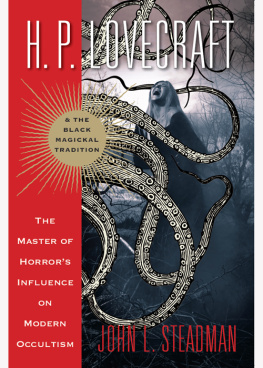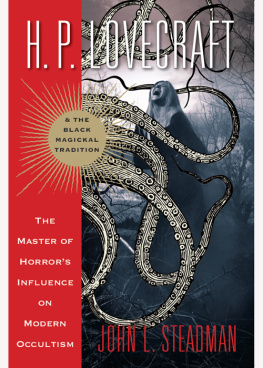Howard Lovecraft - The Temple
Here you can read online Howard Lovecraft - The Temple full text of the book (entire story) in english for free. Download pdf and epub, get meaning, cover and reviews about this ebook. genre: Science fiction. Description of the work, (preface) as well as reviews are available. Best literature library LitArk.com created for fans of good reading and offers a wide selection of genres:
Romance novel
Science fiction
Adventure
Detective
Science
History
Home and family
Prose
Art
Politics
Computer
Non-fiction
Religion
Business
Children
Humor
Choose a favorite category and find really read worthwhile books. Enjoy immersion in the world of imagination, feel the emotions of the characters or learn something new for yourself, make an fascinating discovery.

- Book:The Temple
- Author:
- Genre:
- Rating:3 / 5
- Favourites:Add to favourites
- Your mark:
- 60
- 1
- 2
- 3
- 4
- 5
The Temple: summary, description and annotation
We offer to read an annotation, description, summary or preface (depends on what the author of the book "The Temple" wrote himself). If you haven't found the necessary information about the book — write in the comments, we will try to find it.
The Temple — read online for free the complete book (whole text) full work
Below is the text of the book, divided by pages. System saving the place of the last page read, allows you to conveniently read the book "The Temple" online for free, without having to search again every time where you left off. Put a bookmark, and you can go to the page where you finished reading at any time.
Font size:
Interval:
Bookmark:
The Temple
by Howard Philips Lovecraft
Manuscript Found On The Coast Of Yucatan
On August 20, 1917, I, Karl Heinrich, Graf von Altberg-Ehrenstein, Lieutenant-Commander in the Imperial German Navy and in charge of the submarine U-29, deposit this bottle and record in the Atlantic Ocean at a point to me unknown but probably about N. Latitude 20 degrees, W. Longitude 35 degrees, where my ship lies disabled on the ocean floor. I do so because of my desire to set certain unusual facts before the public; a thing I shall not in all probability survive to accomplish in person, since the circumstances surrounding me are as menacing as they are extraordinary, and involve not only the hopeless crippling of the U-29, but the impairment of my iron German will in a manner most disastrous.
On the afternoon of June 18, as reported by wireless to the U-61, bound for Kiel, we torpedoed the British freighter Victory, New York to Liverpool, in N. Latitude 45 degrees 16 minutes, W. Longitude 28 degrees 34 minutes; permitting the crew to leave in boats in order to obtain a good cinema view for the admiralty records. The ship sank quite picturesquely, bow first, the stem rising high out of the water whilst the hull shot down perpendicularly to the bottom of the sea. Our camera missed nothing, and I regret that so fine a reel of film should never reach Berlin . After that we sank the lifeboats with our guns and submerged.
When we rose to the surface about sunset, a seaman's body was found on the deck, hands gripping the railing in curious fashion. The poor fellow was young, rather dark, and very handsome; probably an Italian or Greek, and undoubtedly of the Victory's crew. He had evidently sought refuge on the very ship which had been forced to destroy his own one more victim of the unjust war of aggression which the English pig-dogs are waging upon the Fatherland. Our men searched him for souvenirs, and found in his coat pocket a very odd bit of ivory carved to represent a youth's head crowned with laurel. My fellow-officer, Lieutenant Kienze, believed that the thing was of great age and artistic value, so took it from the men for himself. How it had ever come into the possession of a common sailor neither he nor I could imagine.
As the dead man was thrown overboard there occurred two incidents which created much disturbance amongst the crew. The fellow's eyes had been closed; but in the dragging of his body to the rail they were jarred open, and many seemed to entertain a queer delusion that they gazed steadily and mockingly at Schmidt and Zimmer, who were bent over the corpse. The Boatswain Muller, an elderly man who would have known better had he not been a superstitious Alsatian swine, became so excited by this impression that he watched the body in the water; and swore that after it sank a little it drew its limbs into a swimming position and sped away to the south under the waves. Kienze and I did not like these displays of peasant ignorance, and severely reprimanded the men, particularly Muller.
The next day a very troublesome situation was created by the indisposition of some of the crew. They were evidently suffering from the nervous strain of our long voyage, and had had bad dreams. Several seemed quite dazed and stupid; and after satisfying myself that they were not feigning their weakness, I excused them from their duties. The sea was rather rough, so we descended to a depth where the waves were less troublesome. Here we were comparatively calm, despite a somewhat puzzling southward current which we could not identify from our oceanographic charts. The moans of the sick men were decidedly annoying; but since they did not appear to demoralize the rest of the crew, we did not resort to extreme measures. It was our plan to remain where we were and intercept the liner Dacia , mentioned in information from agents in New York .
In the early evening we rose to the surface, and found the sea less heavy. The smoke of a battleship was on the northern horizon, but our distance and ability to submerge made us safe. What worried us more was the talk of Boatswain Muller, which grew wilder as night came on. He was in a detestably childish state, and babbled of some illusion of dead bodies drifting past the undersea portholes; bodies which looked at him intensely, and which he recognized in spite of bloating as having seen dying during some of our victorious German exploits. And he said that the young man we had found and tossed overboard was their leader. This was very gruesome and abnormal, so we confined Muller in irons and had him soundly whipped. The men were not pleased at his punishment, but discipline was necessary. We also denied the request of a delegation headed by Seaman Zimmer, that the curious carved ivory head be cast into the sea.
On June 20, Seaman Bohin and Schmidt, who had been ill the day before, became violently insane. I regretted that no physician was included in our complement of officers, since German lives are precious; but the constant ravings of the two concerning a terrible curse were most subversive of discipline, so drastic steps were taken. The crew accepted the event in a sullen fashion, but it seemed to quiet Muller; who thereafter gave us no trouble. In the evening we released him, and he went about his duties silently.
In the week that followed we were all very nervous, watching for the Dacia . The tension was aggravated by the disappearance of Muller and Zimmer, who undoubtedly committed suicide as a result of the fears which had seemed to harass them, though they were not observed in the act of jumping overboard. I was rather glad to be rid of Muller, for even his silence had unfavorably affected the crew. Everyone seemed inclined to be silent now, as though holding a secret fear. Many were ill, but none made a disturbance. Lieutenant Kienze chafed under the strain, and was annoyed by the merest trifle such as the school of dolphins which gathered about the U 29 in increasing numbers, and the growing intensity of that southward current which was not on our chart.
It at length became apparent that we had missed the Dacia altogether. Such failures are not uncommon, and we were more pleased than disappointed, since our return to Wilhelmshaven was now in order. At noon June 28 we turned northeastward, and despite some rather comical entanglements with the unusual masses of dolphins, were soon under way.
The explosion in the engine room at 2 A .M. was wholly a surprise. No defect in the machinery or carelessness in the men had been noticed, yet without warning the ship was racked from end to end with a colossal shock. Lieutenant Kienze hurried to the engine room, finding the fuel-tank and most of the mechanism shattered, and Engineers Raabe and Schneider instantly killed. Our situation had suddenly become grave indeed; for though the chemical air regenerators were intact, and though we could use the devices for raising and submerging the ship and opening the hatches as long as compressed air and storage batteries might hold out, we were powerless to propel or guide the submarine. To seek rescue in the life-boats would be to deliver ourselves into the hands of enemies unreasonably embittered against our great German nation, and our wireless had failed ever since the Victory affair to put us in touch with a fellow U-boat of the Imperial Navy.
From the hour of the accident till July 2 we drifted constantly to the south, almost without plans and encountering no vessel. Dolphins still encircled the U 29, a somewhat remarkable circumstance considering the distance we had covered. On the morning of July 2 we sighted a warship flying American colors, and the men became very restless in their desire to surrender. Finally Lieutenant Menze had to shoot a seaman named Traube, who urged this un-German act with especial violence. This quieted the crew for the time, and we submerged unseen.
Font size:
Interval:
Bookmark:
Similar books «The Temple»
Look at similar books to The Temple. We have selected literature similar in name and meaning in the hope of providing readers with more options to find new, interesting, not yet read works.
Discussion, reviews of the book The Temple and just readers' own opinions. Leave your comments, write what you think about the work, its meaning or the main characters. Specify what exactly you liked and what you didn't like, and why you think so.



